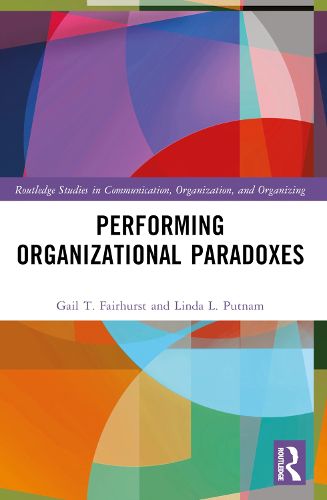Readings Newsletter
Become a Readings Member to make your shopping experience even easier.
Sign in or sign up for free!
You’re not far away from qualifying for FREE standard shipping within Australia
You’ve qualified for FREE standard shipping within Australia
The cart is loading…






Performing Organizational Paradoxes takes a constitutive, process approach to organizational paradoxes. It underscores the performative nature of paradox through underlying dialectical tensions, its sociomaterial foundations, and power features that bring paradoxes to life, sustain them, and enable their transformation.
The book first situates a constitutive approach in the extant organizational paradox literature, by broadening the constitutive approach and addressing the many debates and inaccuracies around it. For the novice, several early chapters devote themselves to considering how paradoxical tensions present themselves, invite responses, and interrelate through their organizing outcomes. For the advanced, latter chapters consider the ubiquity of power and paradox, how bodies escape the quarantine of their paradox narratives, how inventive category work can resist power-imbued paradoxes, and an agenda for future research that challenges scholars to do more on the process side of paradox.
Filling an important gap in the existing literature, this book will be a key resource for scholars and students in the fields of communication, management, educational administration, organizational psychology and any other fields that study organizations.
$9.00 standard shipping within Australia
FREE standard shipping within Australia for orders over $100.00
Express & International shipping calculated at checkout
Performing Organizational Paradoxes takes a constitutive, process approach to organizational paradoxes. It underscores the performative nature of paradox through underlying dialectical tensions, its sociomaterial foundations, and power features that bring paradoxes to life, sustain them, and enable their transformation.
The book first situates a constitutive approach in the extant organizational paradox literature, by broadening the constitutive approach and addressing the many debates and inaccuracies around it. For the novice, several early chapters devote themselves to considering how paradoxical tensions present themselves, invite responses, and interrelate through their organizing outcomes. For the advanced, latter chapters consider the ubiquity of power and paradox, how bodies escape the quarantine of their paradox narratives, how inventive category work can resist power-imbued paradoxes, and an agenda for future research that challenges scholars to do more on the process side of paradox.
Filling an important gap in the existing literature, this book will be a key resource for scholars and students in the fields of communication, management, educational administration, organizational psychology and any other fields that study organizations.